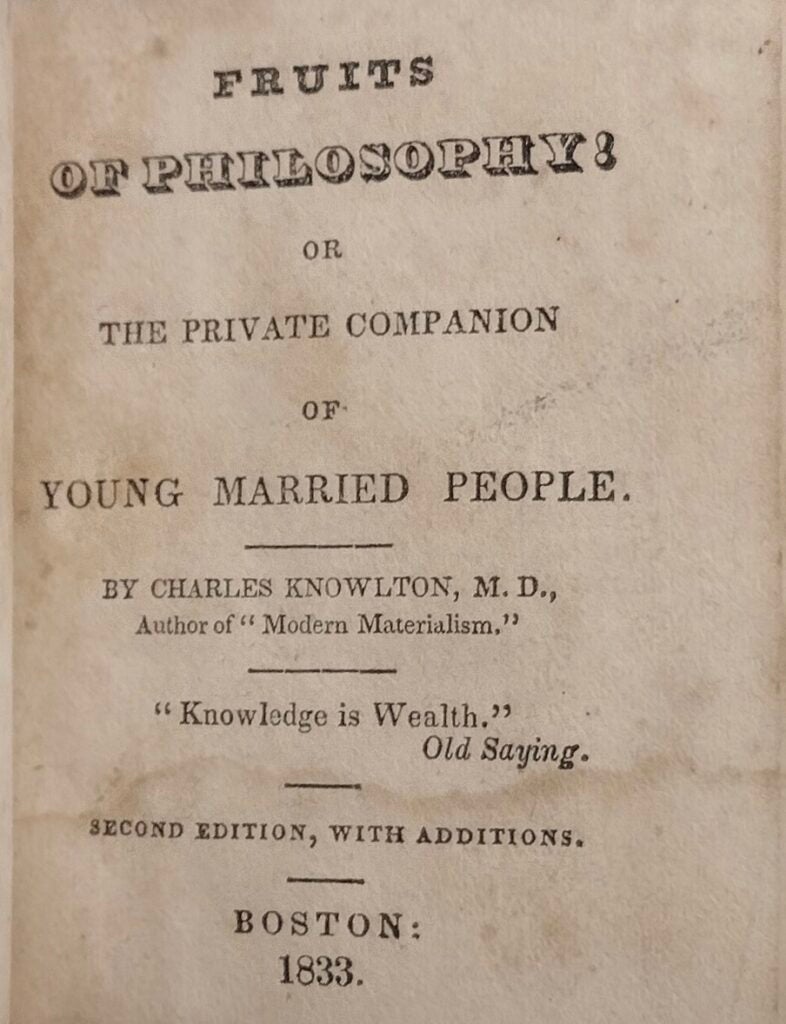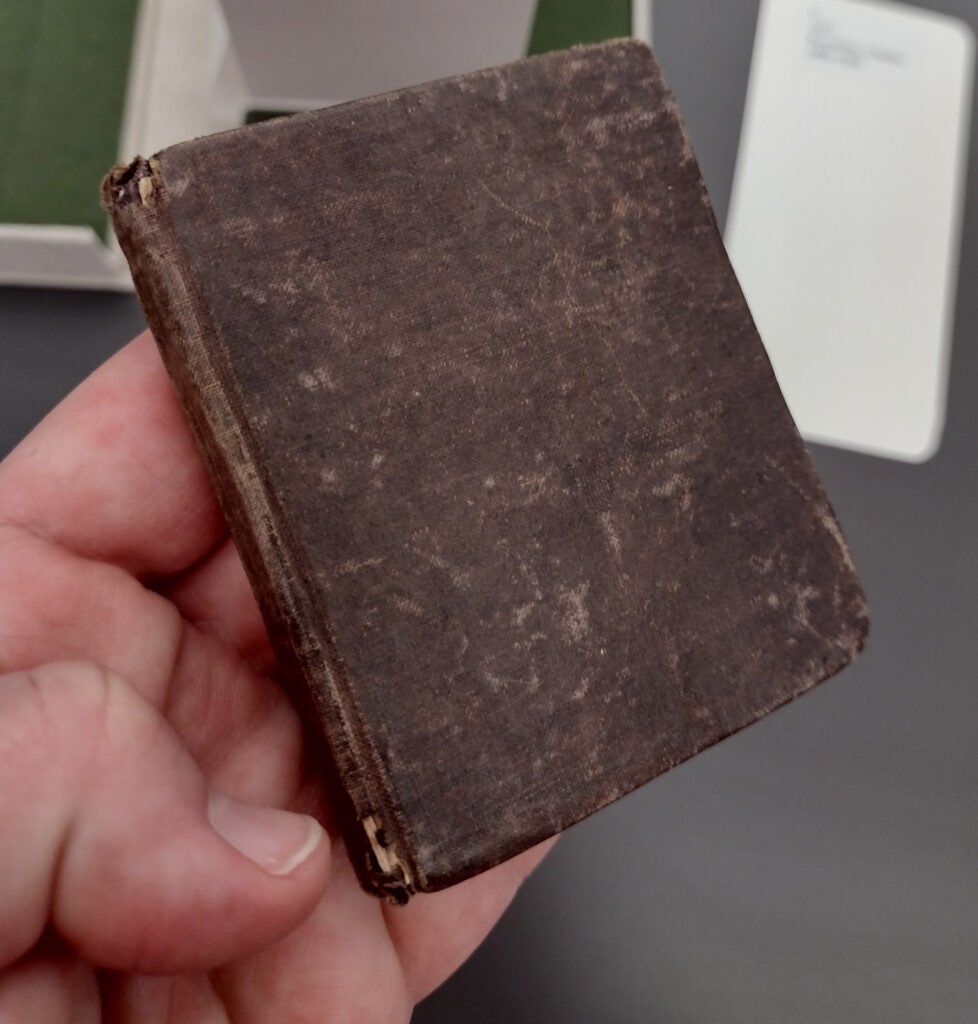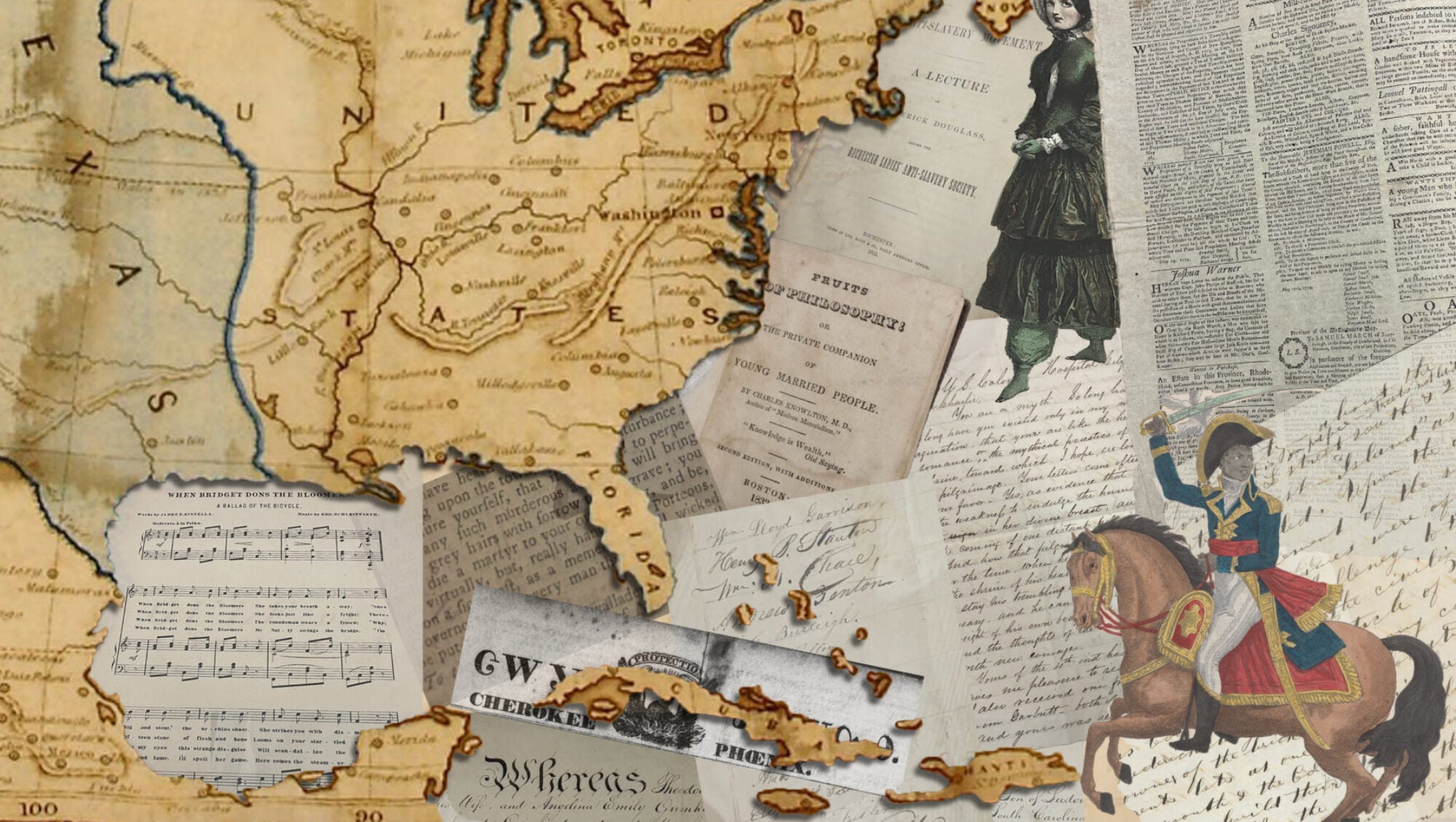by Mariah Cooperwood & Caitlyn Hawley

Fruits of Philosophy was a pocket-sized book written by physician Charles Knowlton and first published in Massachusetts in 1832. This book was the first in the United States to write in detail about the female reproductive system. Even though it was only a three by two and a half inch booklet, it was influential. Anti-obscenity laws prohibited the discussion of contraception and discouraged conversations about sex and women’s health. Since this book included forbidden material and challenged anti-obscenity laws, it became an illegal book in the United States.[1] Knowlton was prosecuted three times and was fined for repeatedly publishing this book.[2] The production and distribution of “obscene” literature exemplifies resistance through the written word, and Fruits of Philosophy especially indicates resistance through its size and content. In seeking to spread knowledge about these topics, the book helped pave the way for critical changes surrounding the conversations of sex, contraception, and reproductive rights.
One of the most notable features of “Fruits of Philosophy” is its size. It was deliberately made to be portable, and readers could hide it without difficulty. The book had to be hidden because it was banned in the United States due to the inclusion of immoral and “obscene” content. Historian Helen Lefkowitz Horowitz has explored nineteenth-century sexual culture in her article, “Victoria Woodhull, Anthony Comstock, and Conflict over Sex in the United States in the 1870s.” The conflict at the center of this article was between two people. A man, Comstock, claimed that a woman, Woodhull, broke a state law. He wanted her punished after she published an article about an influential man’s extramarital affair. Woodhull was then arrested in 1872 for publishing and spreading “obscene” literature. This case, and the subsequent Comstock Act, which outlawed the spread of information about contraception and abortion, emphasize the taboo nature surrounding the conversation of sexuality throughout this time period and the severe punishments that writers experienced.[3] Keenly aware of the potential punishments he could face for publishing this book, Knowlton ensured that the content could be kept secret. The size allowed for this, and it became a key component of making sexual education accessible during the nineteenth century.

 The book challenged anti-obscenity laws by explicitly describing contraception methods. Knowlton’s inclusion of these details regarding sexual health and reproductive choices were disproved by many because he was discussing topics that were not thought to be appropriate for public conversation. Historian Ellen Hartigan-O’Connor, in her book The Ties that Buy: Women and Commerce in Revolutionary America, provides important historical context regarding the conversation around women’s bodies during this time period. She explains that during much of the nineteenth century, for instance, women were not even allowed to wear certain clothes.[4] Therefore, women gaining access to information that could enable them to reclaim control of their bodies was worrisome for a patriarchal society.
The book challenged anti-obscenity laws by explicitly describing contraception methods. Knowlton’s inclusion of these details regarding sexual health and reproductive choices were disproved by many because he was discussing topics that were not thought to be appropriate for public conversation. Historian Ellen Hartigan-O’Connor, in her book The Ties that Buy: Women and Commerce in Revolutionary America, provides important historical context regarding the conversation around women’s bodies during this time period. She explains that during much of the nineteenth century, for instance, women were not even allowed to wear certain clothes.[4] Therefore, women gaining access to information that could enable them to reclaim control of their bodies was worrisome for a patriarchal society.
In his book, Knowlton states, “It is our duty to insist on knowledge, to demand it, to exact it, even at the expense of burning the Bible and deposing a God, for, from our point of view, Nature must be our Bible, God, and Religion.”[5] By this passage, it is evident that Knowlton understood how imperative it was to get useful knowledge about health and reproduction into the world even at the risk of his own freedom. Given that Knowlton published this book several times, it was important to him that he put this kind of power into the hands of his patients and many others.
This book illustrates the more subtle strategies of resistance in early American history. The tiny size of the book enabled people to both easily conceal and distribute it to those who sought forbidden knowledge about contraception. Knowlton’s calculated decisions enabled impactful rebellions against the moral and legal constraints during the 19th century. He influenced legal changes surrounding reproductive rights and inspired others to join the larger movement around women’s rights.[6]
Citations
[1] Charles Knowlton, Fruits of Philosophy! Or The Private Companion of Young Married People (Boston: [publisher not identified], 1833), William L. Clements Library, University of Michigan. The HathiTrust Digital Library edition is Charles Knowlton, Fruits of philosophy: An Essay on the Population Question (London: Freethought Pub. Co.?, Possibly between 1870-1879).
[2] James Green, “A FEW OF OUR FAVORITE THINGS, PART ONE: CHARLES KNOWLTON’S FRUITS OF PHILOSOPHY,” The Library Company of Philadelphia, September 18, 2013, librarycompany.org/2013/09/18/a-few-of-our-favorite-things-part-one-charles-knowltons-fruits-of-philosophy/#/.
[3] Helen Lefkowitz Horowitz, “Victoria Woodhull, Anthony Comstock, and Conflict over Sex in the United States in the 1870s” The Journal of American History 87, no. 2 (2000): 403–34. Also see ““Comstock Act,” Women & The American Story, The New-York Historical Society, https://wams.nyhistory.org/industry-and-empire/fighting-for-equality/comstock-act/.
[4] Ellen Hartigan O’Connor, The Ties That Buy: Women and Commerce in Revolutionary America (University of Pennsylvania Press, 2009).
[5] Knowlton, Fruits of Philosophy! Or The Private Companion of Young Married People.
[6] Jill Lepore, The Secret History of Wonder Woman (New York: Knopf, 2014).

